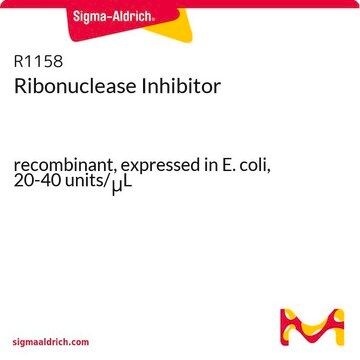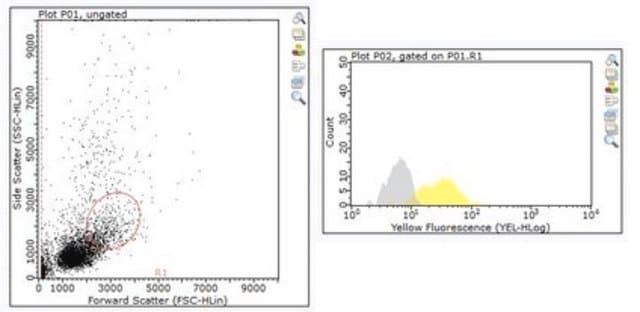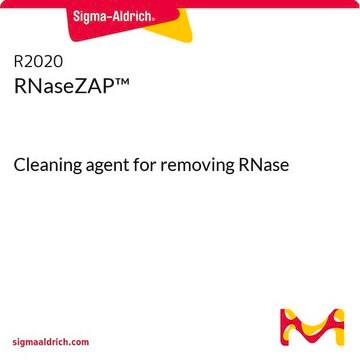556881
Ribonuclease Inhibitor, Human, Recombinant, E. coli
The Ribonuclease Inhibitor, Human, Recombinant, E. coli controls the biological activity of Ribonuclease. This small molecule/inhibitor is primarily used for Protease Inhibitors applications.
Sign Into View Organizational & Contract Pricing
All Photos(1)
About This Item
UNSPSC Code:
12352200
Recommended Products
Quality Level
form
liquid
specific activity
≥20,000 units/mL
manufacturer/tradename
Calbiochem®
storage condition
OK to freeze
foreign activity
Endonuclease and RNase, none detected
shipped in
wet ice
storage temp.
−20°C
General description
Recombinant, human ribonuclease inhibitor expressed in E. coli. Non-competitive inhibitor that inactivates RNase by non-covalent binding. Has been used to improve cDNA synthesis and in vitro RNA synthesis, increase yields of polysomes and aid in the preparation of RNase-free antibodies. Inhibits RNases A, B, and C. Does not inhibit RNase T1 and S1 nuclease from Aspergillus.
Recombinant, human ribonuclease inhibitor expressed in E. coli. Non-competitive inhibitor that inactivates RNase by non-covalent binding. Has been used to improve cDNA synthesis and in vitro RNA synthesis, increase yields of polysomes, and aid in the preparation of RNase-free antibodies. Inhibits RNases A, B, and C. Does not inhibit RNase T1 and S1 nuclease from Aspergillus.
Biochem/physiol Actions
Cell permeable: no
Primary Target
inactivates RNase
inactivates RNase
Product does not compete with ATP.
Reversible: no
Warning
Toxicity: Standard Handling (A)
Unit Definition
One unit is defined as the amount of material that will inhibit 50% of the activity of 5 ng of RNase A.
Physical form
In 50 mM KCl, 20 mM HEPES, 8 mM DTT, 50% glycerol.
Reconstitution
Maintain at -20°C. Avoid freezing solutions. Addition of DTT is recommended to maintain 8 mM level.
Other Notes
Saxena, S.K., et al. 1992. J. Biol. Chem. 267, 21982.
Lee, F.S., et al. 1989. Biochemistry 28, 225.
Lee, F.S., et al. 1989. Biochemistry 28, 225.
Legal Information
CALBIOCHEM is a registered trademark of Merck KGaA, Darmstadt, Germany
Storage Class
12 - Non Combustible Liquids
wgk_germany
WGK 1
flash_point_f
Not applicable
flash_point_c
Not applicable
Certificates of Analysis (COA)
Search for Certificates of Analysis (COA) by entering the products Lot/Batch Number. Lot and Batch Numbers can be found on a product’s label following the words ‘Lot’ or ‘Batch’.
Already Own This Product?
Find documentation for the products that you have recently purchased in the Document Library.
Customers Also Viewed
Vera Thole et al.
BMC genomics, 20(1), 995-995 (2019-12-21)
Flavonoids are produced in all flowering plants in a wide range of tissues including in berry fruits. These compounds are of considerable interest for their biological activities, health benefits and potential pharmacological applications. However, transcriptomic and genomic resources for wild
Nida Ali et al.
Nucleic acids research, 48(2), 847-861 (2019-12-06)
RNase E is a 472-kDa homo-tetrameric essential endoribonuclease involved in RNA processing and turnover in Escherichia coli. In its N-terminal half (NTH) is the catalytic active site, as also a substrate 5'-sensor pocket that renders enzyme activity maximal on 5'-monophosphorylated
Asimina Katsiani et al.
The Journal of general virology, 101(6), 676-684 (2020-05-08)
Rose rosette virus (RRV) (genus Emaravirus) is the causal agent of the homonymous disease, the most destructive malady of roses in the USA. Although the importance of the disease is recognized, little sequence information and no full genomes are available
Ihshan Akthar et al.
Reproduction (Cambridge, England) (2019-12-04)
We previously reported that sperm binding to cultured monolayers of bovine uterine epithelial cells induces an acute inflammatory response involving the Toll-like receptor (TLR2) signaling pathway. This response serves to clear the uterus of sperm and thereby prepares the endometrium
Susara Madduma Hewage et al.
Frontiers in medicine, 7, 80-80 (2020-04-16)
Chronic low-grade inflammation is a major stimulus for progression of chronic kidney disease (CKD) in individuals consuming high-fat diet. Currently, there are limited treatment options for CKD other than controlling the progression rate and its associated complications. Lingonberry (Vaccinium vitis-idaea
Our team of scientists has experience in all areas of research including Life Science, Material Science, Chemical Synthesis, Chromatography, Analytical and many others.
Contact Technical Service









